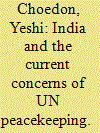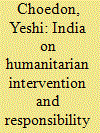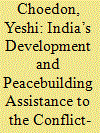| Srl | Item |
| 1 |
ID:
059927


|
|
|
|
|
| Publication |
Jan-Mar 2005.
|
|
|
|
|
|
|
|
|
|
|
|
|
|
|
|
| 2 |
ID:
074189


|
|
|
| 3 |
ID:
103029


|
|
|
| 4 |
ID:
156973


|
|
|
|
|
| Summary/Abstract |
India’s opposition to humanitarian intervention has been influenced by its colonial experience and its predisposition towards the principles of sovereignty and non-intervention. However, India did not adopt a strident opposition in the post-Cold War due to the changed power configuration. The article discusses how India adopted a cautious approach and yet used every opportunity to remind the international community the baleful effect of intervention in the internal affairs. After securing concession to a considerable extent on the ambitious Responsibility to Protect (R2P) and when most of the countries showed an inclination to accept humanitarian intervention in the form of ‘R2P’ at the UN summit in 2005, India grudgingly went along accepting it. India participated in the deliberation on the implementation of R2P and took its stand on various crises in which R2P was evoked. The experience of NATO’s Libya operation under R2P was regarded as substantiation of India’s apprehension of the misuse of the concept, and India reverted its position to the sceptical view of humanitarian intervention/R2P. By mere complaining about the mixing of peace enforcement with peacekeeping, when the United Nations deployed ‘intervention brigade’ for the protection of civilians, India lost the opportunity to take the initiative to propose a new mechanism to deal with the humanitarian crisis in atrocious internal conflicts.
|
|
|
|
|
|
|
|
|
|
|
|
|
|
|
|
| 5 |
ID:
189874


|
|
|
|
|
| Summary/Abstract |
The rationale for India’s development and peacebuilding assistance and the mechanisms employed have changed over the period. India’s assistance is starkly different from the way the developed countries do peacebuilding. This difference is due to India’s different historical experiences, socio-economic conditions and lived experience. The conflict-affected states have appreciated India’s assistance due to the suitability and appropriateness of technical assistance, training and educational programs to their socio-economic context. India’s ways of development and peacebuilding assistance have similarities with the 2016 UN concept of ‘sustaining peace’, which has been formulated to liberate peacebuilding from the strict limitation to post-conflict contexts. However, both the western and non-western donors have a certain reservation about ‘sustaining peace’ concept, for different reasons. The way forward to implement the UN ‘sustaining peace’ is to facilitate both the western and non-western donors to learn lessons from each other’s experiences and view their varied approaches as complementary rather than contradictory.
|
|
|
|
|
|
|
|
|
|
|
|
|
|
|
|
| 6 |
ID:
122639


|
|
|
|
|
| Publication |
2013.
|
| Summary/Abstract |
There were great differences between Indian and Chinese positions on the UN peacekeeping operations during the Cold War. India played a pioneering role both in the conceptualisation and consolidation of the peacekeeping mechanism. On the other hand, China vehemently opposed the UN peacekeeping operation as a tool of imperialism even after joining the United Nations in 1971. Both India and China are apprehensive of motivation of the Western enthusiasm for complex peacekeeping operations of the post-Cold War and both expressed strong reservation on number of issues arising from them. As they do not want to be marginalised hence, despite their reservations, they individually participated actively in the operations with the intention of making a difference through participation. The differences in their participation are partly due to vast experience and confidence of India and partly due to hesitancy of China to engage in new terrain. They have taken similar positions to strengthen UN peacekeeping such as advocating for stronger financial resources, participation of the troop contributing countries in the decision-making process, favouring standby forces, opposing a selective approach and effective training of peacekeepers. Their participation in peacekeeping operations is no longer just a means to prevent Western powers from misusing peacekeeping operations. Different motives and incentives appear to be driving India and China's participation in the peacekeeping operations.
|
|
|
|
|
|
|
|
|
|
|
|
|
|
|
|
| 7 |
ID:
103031


|
|
|
| 8 |
ID:
166812


|
|
|
|
|
| Summary/Abstract |
The establishment of Tibetan Exile Government had served the utility at the time when there was urgent need for preservation of Tibetan culture and religion, which were under the relentless destruction by the Chinese rule in Tibet, when there was fervent expectation to free Tibet from the grip of China and return of exile Tibetan community to the free homeland soon. It was the time when all the Tibetan refugees were in South Asia and when there was a requirement to display and maintain solidarity and unity of people of all the three major regions of Tibet. It was also a period which required sensitization and mobilization of international support for the cause of Free Tibet.
|
|
|
|
|
|
|
|
|
|
|
|
|
|
|
|
| 9 |
ID:
144654


|
|
|
|
|
| Publication |
New Delhi, KW Publishers Pvt Ltd, 2015.
|
| Description |
xii, 256p.pbk
|
| Standard Number |
9789383649549
|
|
|
|
|
|
|
|
|
|
|
|
Copies: C:1/I:0,R:0,Q:0
Circulation
| Accession# | Call# | Current Location | Status | Policy | Location |
| 058634 | 341.584/CHO 058634 | Main | On Shelf | General | |
|
|
|
|